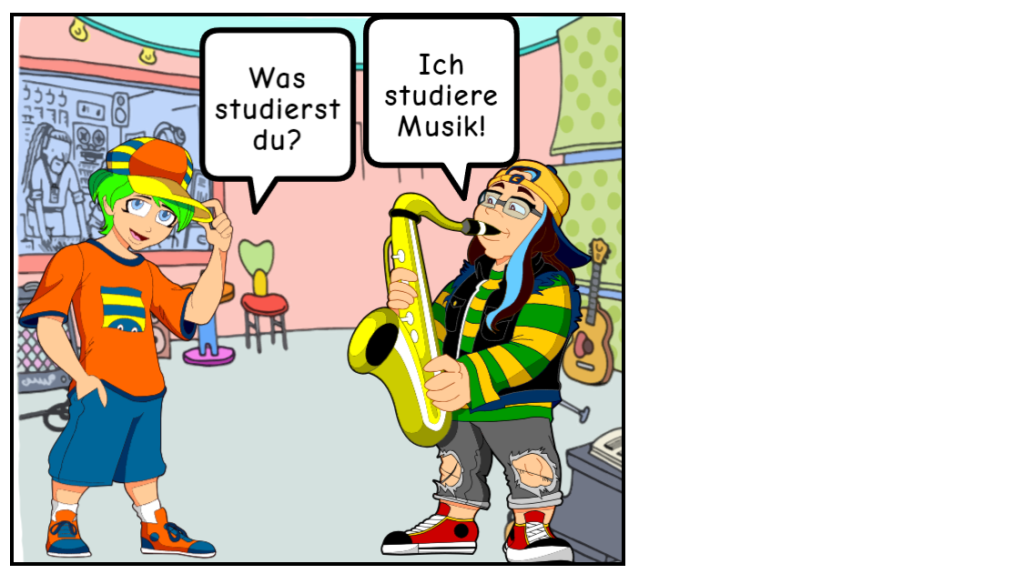5.1 Was studierst du?

Guten Tag!
Zum Aufwärmen machen wir unseren Tagesminiplausch und eine Wiederholung.
Wiederholung
In the previous lesson, you learned how to discuss when you do your hobby. Let’s review what you have learned.
Was ist dein Lieblingshobby? Wie oft machst du dein Hobby? Einmal die Woche, zweimal die Woche, jeden Tag? Take a minute to answer these questions in your written journal.
Lektionsüberblick
The first question you generally get about college is regarding your major (and minor). In this lesson, you will be introduced to a large number of majors (and minors). As with past lessons with larger lists of vocabulary, you should focus on committing to memory the words and phrases most relevant for you. With the rest of the words and phrases, you should learn them well enough to be familiar with them when reading or hearing them. In the end, you will be able to 1) say where you go to college, 2) recognize some majors, 3) what your major is, and 4) say where you are in your degree.
1) Wo ich studiere
Read and listen to the comic below.
 |
|
Let’s practice.
Jetzt bist du dran!
2) Studienfächer
You will find that many of the fields are study look similar to their English counterpart. This is because they are cognates and originated from the same original word. Look at the lists below categorized by cognates, near cognates, and other fields of studies that are not cognates. Which subjects are relevant to you? Find your major (and minors)!
Be sure to click through each slide and listen to the audio.
Let’s practice. Read the descriptions and choose the field of study being described. Wait a beat after each description and a new one will appear.
Kleiner Hinweis
In Germany, the Lehramtstudium (education for levels above elementary school) requires two major subjects. That means a person would study Deutsch und Geschichte auf Lehramt – not just Deutsch auf Lehramt or Geschichte auf Lehramt. The two subjects do not need to have anything to do with each other. For example, you can study Deutsch und Sport auf Lehramt.
Jetzt bist du dran!
3) Was ich studiere…
Read and listen to the comic below.

Let’s practice.
Kleiner Hinweis
For those with a major (Hauptfach) and a minor (Nebenfach), the following structure will be helpful.
Ich studiere … im Hauptfach und … im Nebenfach.
Beispiel (Example): Ich studiere Biologie im Hauptfach und Deutsch im Nebenfach.
Jetzt bist du dran!
4) How to say what year of study you are in
In your conversations with native speakers, you will most likely be asked one of these questions. Listen to how they sound.
| In welchem Semester bist du? | |
| In welchem Jahr bist du? |
Read the Kleiner Hinweis below and then read and listen to some possible responses to the questions above.
Kleiner Hinweis
Germans count the time in their degrees in semesters instead of years. Because of this discrepancy, we will show you both questions (what year and which semester), but you will most likely hear the question about semesters from German speakers and the question about the year from other learners of German or German speakers intimately familiar with the US system.
Because German speakers count in semesters instead of years, there are no equivalent words for freshman, sophomore, junior, and senior.
When you get the semester question, you can decide whether you want to answer in years or in semesters.
Jetzt bist du dran!
Kleiner Hinweis
University Education in Germany
In Germany, university education is free or almost free (500 Euro per term only in some Federal states, completely free in others). There are only two terms per year: from October to March and from April to September. The grade for the course is often based on a single paper or exam. In the past, the typical university degree was essentially equivalent to an MA. There was no BA/BS degree. While German universities now offer a BA/BS, in order to stay internationally relevant, the MA is still seen as the “complete” course of university studies.
The admissions process for German universities is generally quite different from the US. You submit your request for your top three choices and what you want to study to a central office. Whether you get in depends on your Abi-score (based on a set of exams you take at the end of your schooling) and how many spots are available for that major. The most popular majors at a given university require the highest score.

*As you conclude this lesson, don’t forget to check Canvas!*

Media Attributions
- 1010-1020 banner long large reduced
- Comic made at www.MakeBeliefsComix.com
- 5.1 Was studierst du
- Private: confidence scale_large horizontal_updated

